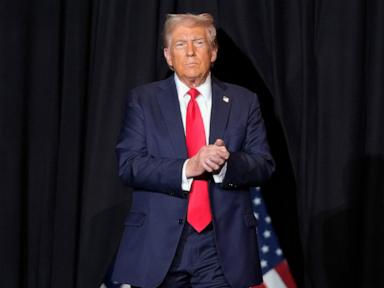Calling Trump ‘fascist’ displays historical ignorance

The term “fascist” has been increasingly used to describe President-elect Donald Trump, including by former high-ranking members of his White House staff. However, labeling Trump a fascist is inaccurate and oversimplifies both his actions and the historical gravity of true fascism.
While Trump’s rhetoric and some policies may be authoritarian and nationalistic, they lack the full structure and ideological underpinnings of classic fascism.
First, fascism requires a coordinated state-driven project aimed at establishing an authoritarian, nationalist regime that aims for total control. Trump, in contrast, has consistently undermined even his own government’s coordination, often creating chaos rather than the centralized control that defines fascism.
Fascist leaders such as Mussolini and Hitler worked to build tightly controlled, militarized regimes with extensive state planning, centralizing power and streamlining societal control. Trump’s administration utterly lacked such coordination, often due to his limited engagement with formal policymaking, his preference for personal loyalty and his spontaneous decision-making style that left federal agencies scrambling for coherence.
Second, although Trump’s rhetoric sometimes exhibits nationalistic and populist elements, he has neither suppressed his opposition nor dismantled the democratic process to the extent seen in true fascist regimes. During his first term, American institutions, from the judiciary to the media, remained operational and actively countered his initiatives, as when courts blocked parts of his travel ban. Even during controversies like the Jan. 6 attack on the Capitol, law enforcement, Congress and the courts proceeded with their work and pursued legal processes against those involved.
This resistance to centralized control distinguishes Trump’s impact from that of a true fascist regime, where dissent is crushed by state forces.
Moreover, fascist regimes are known to scapegoat specific groups and enforce racial and cultural homogeneity. Trump’s policies, in contrast, focused on immigration rather than outright racial purity laws. His stance, although restrictive, was largely targeted at illegal immigration and involved deportation efforts similar to those pursued by past administrations of both parties.
Although Trump’s rhetoric is sometimes inflammatory, it is nothing like the systemic racial laws seen in fascist histories, such as Italy’s anti-Jewish laws or Germany’s Nuremberg Laws. These laws systematically stripped rights from entire groups, using state power to enforce brutal oppression and even extermination, far beyond Trump’s focus on controversial immigration enforcement.
Additionally, the cult of personality surrounding Trump, though intense, differs from the archetypal fascist adulation of leaders. Fascist dictators like Mussolini and Hitler were revered with a near-divine status among the populace, often through state-orchestrated propaganda campaigns aimed at fostering loyalty and devotion.
Trump’s appeal, on the other hand, stems from his populist, anti-establishment brand and relies heavily on the unique cultural and political divisions within American society, rather than on a cohesive fascist movement or government-directed propaganda. The opposition to Trump is broad and vocal, a feature fascist systems rarely permitted. Under fascist regimes, dissent is forcibly extinguished.
In the context of global authoritarianism, Trump might best be seen as a populist leader with authoritarian impulses rather than a fascist. Leaders with similar characteristics have appeared in various democratic systems, where strong populist appeals resonate with portions of the public disenchanted with traditional politics. Trump’s populism — with its critique of globalization, government inefficacy and elite interests — speaks to the frustrations of a significant American demographic. But populism does not equate to fascism. In fact, democracy has historically withstood populist leaders by relying on checks and balances, as it largely did during Trump’s first term.
The risk of calling Trump a fascist lies in the dilution of the term. “Fascism” should not be applied to any leader with authoritarian tendencies or populist rhetoric. It diminishes the specificity of fascist ideology, which was historically rooted in coordinated, militarized suppression and cultural purity campaigns. Our democratic system, though tested, proved resilient in Trump’s first term, unlike true fascist movements, which demolish all opposing power centers and consolidate control.
While Trump’s actions may reflect a worrying rise in authoritarian populism, they fall far short of fascism’s brutal consolidation of power and singular vision of society. Describing Trump as a fascist is an oversimplification that risks misunderstanding both Trump’s impact and the nature of true fascism.
Rather than demonizing Trump with a historically charged label, critics and defenders alike would benefit from a more nuanced understanding of his political style, the robustness of democratic checks and balances and the enduring differences between populist authoritarianism and fascist regimes.
Andrew Latham is a professor of international relations at Macalester College in Saint Paul, Minn., a senior fellow at the Institute for Peace and Diplomacy, and a non-resident fellow at Defense Priorities in Washington, D.C.
-

Kamala Harris Calls Donald Trump ‘A Fascist’
Top stories - BBC News - October 24 -

Trump's being called a 'fascist.' What does that mean?
Top stories - ABC News - October 24 -

Mark Cuban: 'It’s not a stretch to call Donald Trump a fascist'
Politics - The Hill - October 28 -

Johnson and McConnell: Harris calling Trump ‘fascist’ could invite assassination attempt
Politics - The Hill - October 25 -

Tapper mocks GOP leaders with clips of Trump calling Harris 'fascist'
Politics - The Hill - October 25 -

Mayor Adams Bucks Harris and Democrats on Calling Trump a ‘Fascist’
Top stories - The New York Times - October 27 -

Sanders won’t label Trump a ‘fascist,’ calls him ‘authoritarian’
Politics - The Hill - October 27 -
Eye Opener: Trump defends himself against being called a "fascist"
Top stories - CBS News - October 29 -

Scientific American Editor Resigns After Calling Some Trump Supporters ‘Fascists’
Business - The New York Times - November 15
More from The Hill
-

Murray signals openness to supporting Trump's pick to head Labor
Politics - The Hill - 38 minutes ago -

Bolton slams Trump's pick for counterterrorism director as 'con man'
Politics - The Hill - 56 minutes ago -

Biden can still enact Kamala Harris's Opportunity Agenda for Black Men
Politics - The Hill - 1 hour ago -

Trump Cabinet picks: Here’s who’s on the list to carry out his agenda
Politics - The Hill - 1 hour ago -

Musk, Ramaswamy ‘DOGE’ confidence in Supreme Court may be tested
Politics - The Hill - 3 hours ago